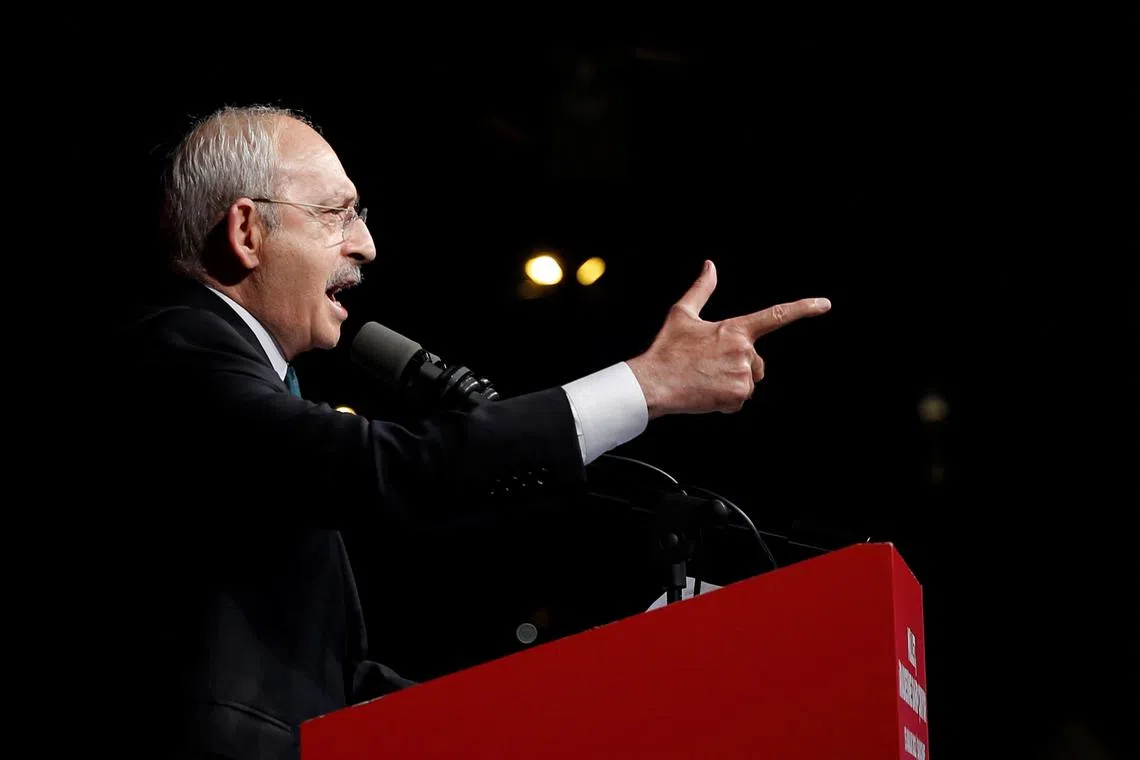Erdogan rivals’ time to shine turns into leadership crisis ahead of Turkey elections
Sign up now: Get ST's newsletters delivered to your inbox

Main opposition party CHP’s leader, Mr Kemal Kilicdaroglu, put himself forward again.
PHOTO: REUTERS
Follow topic:
ANKARA – Turkey’s opposition is in crisis over a failure to agree on a joint candidate to contest President Recep Tayyip Erdogan.
It is hampering a rare chance to unseat the country’s longest-serving leader at elections in less than three months.
Leaders of the six–party opposition met on Thursday to break the impasse after months of internal conflict that prevented them from agreeing on a name.
Main opposition party CHP’s leader, Mr Kemal Kilicdaroglu, put himself forward again.
But he failed to get the backing of the second-largest member of the bloc, IYI Party, according to people with direct knowledge of the matter.
Ms Meral Aksener, head of IYI, will either go with the rest of the bloc or announce a separate candidate.
It is a decision she will make by Monday after meetings with the party’s top brass, said the people, who spoke on condition of anonymity to share the sensitive information.
Thursday’s meeting marked the 12th time opposition leaders came together.
But their failure to agree on who should run has exposed them to frequent attacks from Mr Erdogan.
The Turkish President accused them of being disorganised, telling the electorate that they remain too divided on important issues to run the country.
A day before the opposition’s last summit, Mr Erdogan called for presidential and parliamentary elections on May 14.
The announcement quashed speculation the vote would be postponed following two deadly earthquakes.
May elections
It will remain the toughest electoral race of Mr Erdogan’s two decades in power.
He has stepped up a multibillion-dollar reconstruction effort after last month’s disaster that levelled cities and killed more than 45,000 people, after the government faced sharp criticism for the initial quake response.
The opposition has failed to effectively communicate its policy on vital topics from the economy to international relations, said Mr Bekir Agirdir, head of the Konda polling agency.
It should have the upper hand due to the government’s perceived bungled crisis response, but it has missed the mark.
“Its continued infighting over the candidate coupled with its failure to convey its main vision on critical matters are hampering its chances,” said Mr Agirdir, whose agency successfully predicted the margin of victory for local elections in 2019, when the opposition’s Mr Ekrem Imamoglu took Istanbul.
Surveys consistently show a decline in support for the opposition bloc, though the numbers remain too close to predict a winner.
Early last year, more voters predicted the opposition would win. But sentiment has gradually changed in Mr Erdogan’s favour in the last few months.
The Turkish President has assumed greater powers since 2018 and remains Turkey’s most popular politician.
This is despite his Justice and Development Party losing some support among poor Turks who had been among its most stalwart backers.
Turks are also dealing with the worst cost-of-living crisis in decades, which only looks set to get worse as the impact of the earthquakes filters through the economy.
To defeat Mr Erdogan in the presidential race, opposition parties must rally behind a candidate that can lure support of the pro-Kurdish HDP which has emerged as kingmaker in past elections.
That is because the HDP is now facing a potential ban because of alleged ties to separatist Kurdish militants.
Voters appear split when it comes to the opposition.
Less than half of the electorate is expected to vote in favour of Mr Erdogan’s AK Party and nationalist allies, according to recent polling.
But those voting for the opposition are split mainly between the six coordinated parties and the pro-Kurdish HDP.
That may allow Mr Erdogan and his allies to divide and conquer at the polls. BLOOMBERG

